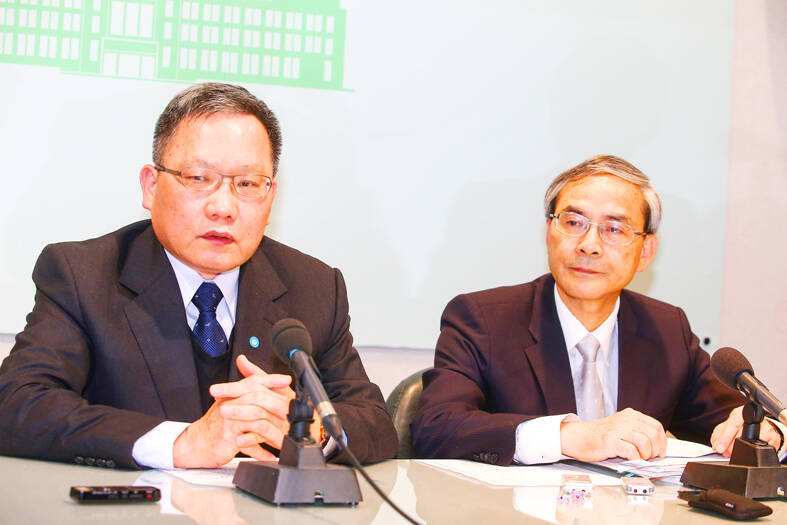Minister of Finance Su Jain-rong (蘇建榮) is to step down from his post on Monday to return to teaching at National Taipei University, Cabinet spokesman Lo Ping-cheng (羅秉成) said yesterday.
Su has tendered his resignation and Premier Su Tseng-chang (蘇貞昌) has approved it, Lo said.
Su Jain-rong has been on leave from his post at the university, where he is a professor in the Department of Public Finance.

Photo: CNA
Deputy Minister of Finance Frank Juan (阮清華) is to take on Su Jain-rong’s duties as acting minister after his departure, Lo added.
During yesterday’s weekly Cabinet meeting, the last one with Su Jain-rong in attendance, Su Tseng-chang praised the outgoing minister for stabilizing the nation’s finances amid a US-China trade dispute, the COVID-19 pandemic, China’s military threats and Russia’s invasion of Ukraine.
The premier said that Su Jain-rong had ensured budget flexibility and sustainability, freed up funds from existing budgetary items, and reduced national debt.
He established a reasonable tax system, cut government expenditure, took measures to deter speculation, introduced tax breaks on remittances from overseas and simplified tax filing procedures, the premier said.
On Su Jain-rong’s watch, the government recorded annual surpluses of more than NT$100 billion (US$3.26 billion) for four consecutive years, and international credit-rating agencies last year raised Taiwan’s credit rating, which are remarkable achievements, he added.
Su Tseng-chang thanked Su Jain-rong for his contributions to the nation and expressed the hope that he would apply his practical experience to foster financial talent among his students.
Separately, Juan said in an interview that he would do his best to stabilize the nation’s finances during a time of economic volatility.
Taiwan’s economy faces challenges such as the US Federal Reserve further raising interest rates, a global economic downturn and sluggish sales, he said.
These challenges have hampered the efficacy of the National Stabilization Fund (NSF), which was activated in July to boost investor confidence, he added.
As the Taiwan Stock Exchange continues to face uncertainties, the fund would continue to support the local equity market next year, said Juan, who is also the executive secretary for the NSF Management Committee.

UNCERTAINTY: Innolux activated a stringent supply chain management mechanism, as it did during the COVID-19 pandemic, to ensure optimal inventory levels for customers Flat-panel display makers AUO Corp (友達) and Innolux Corp (群創) yesterday said that about 12 to 20 percent of their display business is at risk of potential US tariffs and that they would relocate production or shipment destinations to mitigate the levies’ effects. US tariffs would have a direct impact of US$200 million on AUO’s revenue, company chairman Paul Peng (彭雙浪) told reporters on the sidelines of the Touch Taiwan trade show in Taipei yesterday. That would make up about 12 percent of the company’s overall revenue. To cope with the tariff uncertainty, AUO plans to allocate its production to manufacturing facilities in

TAKING STOCK: A Taiwanese cookware firm in Vietnam urged customers to assess inventory or place orders early so shipments can reach the US while tariffs are paused Taiwanese businesses in Vietnam are exploring alternatives after the White House imposed a 46 percent import duty on Vietnamese goods, following US President Donald Trump’s announcement of “reciprocal” tariffs on the US’ trading partners. Lo Shih-liang (羅世良), chairman of Brico Industry Co (裕茂工業), a Taiwanese company that manufactures cast iron cookware and stove components in Vietnam, said that more than 40 percent of his business was tied to the US market, describing the constant US policy shifts as an emotional roller coaster. “I work during the day and stay up all night watching the news. I’ve been following US news until 3am

Taiwan will prioritize the development of silicon photonics by taking advantage of its strength in the semiconductor industry to build another shield to protect the local economy, National Development Council (NDC) Minister Paul Liu (劉鏡清) said yesterday. Speaking at a meeting of the legislature’s Economics Committee, Liu said Taiwan already has the artificial intelligence (AI) industry as a shield, after the semiconductor industry, to safeguard the country, and is looking at new unique fields to build more economic shields. While Taiwan will further strengthen its existing shields, over the longer term, the country is determined to focus on such potential segments as

COLLABORATION: Given Taiwan’s key position in global supply chains, the US firm is discussing strategies with local partners and clients to deal with global uncertainties Advanced Micro Devices Inc (AMD) yesterday said it is meeting with local ecosystem partners, including Taiwan Semiconductor Manufacturing Co (TSMC, 台積電), to discuss strategies, including long-term manufacturing, to navigate uncertainties such as US tariffs, as Taiwan occupies an important position in global supply chains. AMD chief executive officer Lisa Su (蘇姿丰) told reporters that Taiwan is an important part of the chip designer’s ecosystem and she is discussing with partners and customers in Taiwan to forge strong collaborations on different areas during this critical period. AMD has just become the first artificial-intelligence (AI) server chip customer of TSMC to utilize its advanced